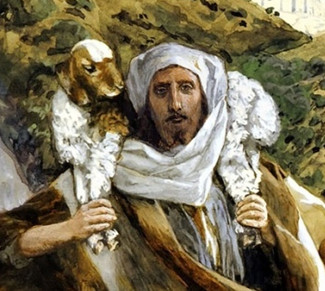The warning of Jeremiah, speaking on behalf of God, bemoans those "shepherds who mislead and scatter the flock of my pasture." The "shepherds" that Jeremiah is referring to are Israel's rulers. The nation's rulers, along with the priests and prophets, were supposed to play a role in helping the nation fulfill its vocation as God's people. Yahweh had carefully and lovingly shepherded Israel and Judah. But those whose duty it was to be His instruments were, for the most part, a huge disappointment. Without good and righteous leadership, the very covenant between God and the people had suffered.
These rulers had not protected the frail and powerless. Poor leadership had brought disaster to the nation, for when Jeremiah was writing these words, the Babylonian captivity had already begun. Eventually, the royal line would end and the nation would be taken into exile. Before it was over, Jerusalem and its temple would lie in ruins.
 Even if we want to avoid reflecting on this first reading, the issue of God indicting the shepherds of the flock will not allow us to do so.
Even if we want to avoid reflecting on this first reading, the issue of God indicting the shepherds of the flock will not allow us to do so.
Today we face a similar dilemma to that which confronted Jeremiah.
When national or political leadership is defective, when our public discourse on the economy, terrorism, immigration, health care, racism, xenophobia, sexual orientation, violence, and poverty sinks to name-calling, vilifying and finger-pointing, the consequences for ordinary people are disastrous. It becomes easy for us feel that we are in a desert, devoid of civility, searching the horizon for a path to moral rectitude.
The Catholic Church sometimes also seems to be infected with the perennial virus: loss of perspective and disunity. We know something about the agony of transition, of being scattered, of discontinuity and the turbulence of crisis. Sex abuse scandals continue to make headlines. Pope Francis has recently accepted the resignation of two more Chilean Catholic bishops, bringing to five the number of prelates he has replaced so far as part of the continuing fallout from the country’s clergy sexual abuse crisis. We have also seen Cardinal Theodore McCarrick resign in face of forty year old accusations and Cardinal Pell of Australia facing civil charges for his part in hiding predator priests and quashing investigations.
But crisis has always triggered the best of Christian reflection. The experience of change, of suffering, of hopes uncertain, can force us to dig deep into our tradition and to discover its power anew.
Despite the gloomy conditions that Jeremiah highlights among God's people, the reading has a breath of hope – and for this we can be grateful. While the rulers are blamed and threats are leveled against them, there is a promise for a brighter future. God will step in to "gather the remnant," to bring them back from exile. To accomplish this renewal, God promises to appoint shepherds who will fulfill their appointed office faithfully.
But He promises even more. A special shepherd will be sent, "...I will raise up a righteous shoot to David." A new time is coming, despite the present distress. God promises not to abandon the people, but to renew them and form a new community with faithful leadership.
This promise to the people is fulfilled in Jesus. He personifies God's compassion for both the disciples - who will shepherd in Jesus' name - and for the people - who need to be gathered together and raised up. Jesus is more than a shepherd; he is God's compassion made flesh.
The compassion of Jesus the Shepherd is as intense now as it has always been for the needs of the crowds. He has not forgotten them; he has not forgotten us. He speaks to us all. Each of us has shepherding responsibilities to family, the young, the needy and to society in general. All of the baptized are sent out to speak and act in Jesus' name.
Our world and our church need healing and renewal. Each of us can play a part in this moment's potential for growth, by finding ways to speak to one another and to care for one another in His name. For only he can heal and renew what has been so wounded. Only he can help us face what divides and destroys our communal bonds. Only he can feed us and heal us so that we can face what assails our lives as citizens and disciples, be witnesses to hope and continue to preach, teach and heal as he did.
What's clear in our Scripture this week is that a scattered and needy people are not left on their own to figure things out or put their house in order by themselves. God, speaking through Jeremiah, makes it clear to a shepherdless people, "I myself will gather the remnant of the flock....I will appoint shepherds for them who will shepherd them." Jesus is the proof that God is doing just that. Not only is Jesus assuming the shepherding task, but he is training others to carry on when he is gone.
This is our mission. Evil hurts us and scandal shocks us, but these have no authority over our power for goodness. And it is precisely our commitment and our fight for goodness, enriched by love and guided by virtuous leadership, that empowers us to acknowledge sin, dwell in hope, and accept the greater purpose of our lives and of our faith in Jesus Christ.
As we continue on in these unsettled times, we will see even more clearly that being a discilple - being a shepherd - is not about religion, with its doctrines and rules and traditions; it is about life.





